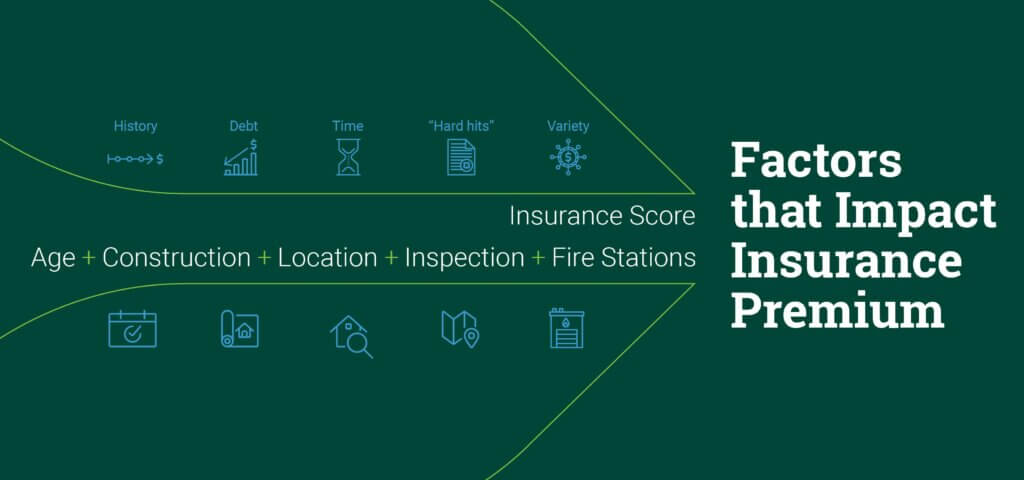
What’s My Insurance Score?
Insurance score vs. credit score — what you need to know
March 28, 2023 — Homeowner insights | Inflation insights | Insurance insights
When you purchased your home (if not before), you learned about the factors that go into compiling your credit score and its impact on securing a homeowners loan. What you might not have learned is that closely related to your credit score is an insurance score.
Homeowners insurance companies use your insurance score to determine your likelihood of filing costly claims and what risk they might incur by insuring your property. Insurance scores, and several other factors, impact your insurance rates and your homeowners insurance premium, or the price you pay for the amount of coverage you need to protect your home against losses.
What is an insurance score?
Insurance scores often come from the same companies that produce and sell credit scores. These companies collect data on consumers and provide it to companies looking to assess whether to do business with an individual and, if they do engage in business, how risky that business might be. Higher scores represent individuals with a lower risk. Lower scores indicate more risk. There are very few reputable insurance companies that do not use insurance scores.
Credit score vs. insurance score
Credit scores predict how likely an individual is to repay their debts. Home insurance scores indicate how risky an individual is to an insurance company or how likely they are to file an expensive homeowners insurance claim. Claims cost an insurance company money, so insurers use this score to predict whether future claims will cost more than the premium a homeowner is paying.
An insurance score is also called a credit-based insurance score because it’s based on some of the information in your credit history and often calculated by the same agency that calculates your credit score. But it’s not the same.
How is my insurance score calculated?
Companies that calculate insurance scores use a subset of your individual financial history data to predict the insurance risk you present. That’s why your insurance score is called a credit-based insurance score. FCRA (Fair Credit Reporting Act) rules do not allow insurance companies to access everything in an individual’s record.
Companies that calculate insurance scores don’t share their algorithms, so the exact way a score is calculated is not fully known. However, five components of financial history are relevant to insurance companies.
- Payment history — how well an individual pays back a loan and how well they pay it back in time
- Current debt — how much the customer owes to other lending sources
- Age of credit — the number of years of experience the individual has paying back their debt
- Pursuit of credit — how many other companies have asked for financial checks on the individual recently
- Types of credit — the variety of accounts the customer has, including student debt, home mortgages and car loans
Using the data collected in these categories and factors assigned through the algorithms, reporting agencies like TransUnion calculate an insurance score intended to represent the level of risk a policyholder presents for an insurance company. Even though reporting companies do not have to disclose how they calculate an individual’s score, they are required to report on which categories draw a score down. If you don’t have a top-tier score, an explanation is included in the FCRA special notice at the back of your policy. If you feel it (the explanation) is not accurate, you can file a dispute with the reporting company. After you file a dispute, they are required to investigate and correct any errors.
What is a good insurance score?
Companies that calculate insurance scores sell raw insurance scores to insurance companies that typically assign levels or descriptions to the insurance score ranges. The scale or range used by individual insurance companies varies based on the proprietary methodology used to determine a score. Insurance scores can range anywhere from 0 to 1,100. Scores above 700 are considered good.
How does my insurance score affect my insurance premiums?
The insurance score can affect the price of your homeowners insurance but is not used in isolation when determining insurance cost. Additionally, some states have regulations preventing the use of credit for insurance purposes. Other rating factors also determine a homeowner’s premium. These include the age of your roof, the type of construction materials used, a home’s location, findings from an inspection report and proximity to a fire station.
Premiums are adjusted each year at renewal to account for changes in rating factors. Some factors like construction and location won’t change, but others like insurance score and inflation can.

I think my insurance score has gone up. Can you reorder it?
Your insurance score is impacted by many factors. One of these is the amount of time you’ve had paying back debt. This is not something that changes within weeks or months. For this reason, most insurance companies only request new insurance score information every three years.
In some cases, insurance companies can reorder insurance scores, but it’s rare for scores to change unless there have been errors or significant changes in the factors that impact the score. And, any new score must be used, even if the change isn’t favorable and negatively impacts the premium.
Will an insurance score check affect my credit score?
You may worry that an insurance score check will affect your overall credit score, but there’s no need to fret. Credit checks are known as hard hits. They show up in credit history when someone applies for new loans. Many hard hits can indicate financial difficulty and will negatively affect an individual’s credit and insurance score.
A request made by an insurance company is considered a soft hit and does not appear in the customer’s credit history or affect the insurance or credit score. Free annual audits are also soft hits and do not affect credit ratings. It’s a good idea to check your credit score annually to monitor your credit history. If you notice bad information in a credit report, you can file a dispute with the reporting agency.
How do I check my insurance score?
Since insurers can use different reporting companies to collect and assign insurance scores, checking your insurance score isn’t always straightforward. However, because your credit score directly impacts your insurance score, monitoring your credit score is the first step to maintaining a good insurance score. Reporting agencies provide a free credit report annually without causing a “hard hit” and affecting your credit history.
How can I improve my credit-based insurance score?
You can improve your credit-based insurance score the same way you would improve your credit score. First conduct an audit of your current score. If it’s accurate and you need to increase your score, focus on paying bills on time, using credit cards responsibly, paying down debt or loans, and consolidating your debt. Over time, with responsible management, your score will increase.
Now that it’s broken down, your insurance credit score should be more straightforward and less elusive. If you are a responsible homeowner with a healthy financial history and you file claims for covered losses with discernment, you’re doing everything you can to protect your home insurance score. Remember, this score isn’t the only factor that can impact insurance rates and cause increases to your premium. Some factors might be beyond your control. However, there are smart ways to lower your insurance premium.
